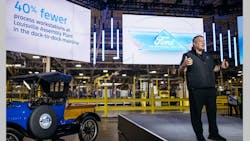Ford's Next Model T Moment, MEPs Are 'Do' Tanks, Not Think Tanks: So That Happened
Key Highlights
- There is a significant need to reshape perceptions of blue-collar work, highlighting its modern, skilled, and tech-enabled nature to attract younger workers.
- Leadership transition takes shape at Chart Industries.
- Deloitte's 2026 outlook emphasizes increased investment in AI, digital tools, and data-driven manufacturing strategies to enhance efficiency and supply chain resilience.
- Ford's upcoming electric pickup aims to reduce parts and increase line speed by 15%, marking a major step toward affordable EVs and manufacturing innovation.
- MEPs provide tailored, practical support to manufacturers, helping them adopt new technologies, improve productivity, and build competitive capabilities.
Editor’s note: Welcome to So That Happened, our editors’ takes on things going on in the manufacturing world that deserve some extra attention. This will appear regularly in the Member’s Only section of the site.
MEPs: ‘Do’ Tanks, Not Think Tanks
Reaction is rolling in to our Nov. 18 story on the Trump administration’s planned defunding of nonprofit Manufacturing Extension Partnerships (MEPs).
Chris Baichoo, CEO and executive director of Wisconsin’s MEP, WMEP Manufacturing Solutions, wrote:
“WMEP’s purpose is straightforward: we help small and mid-sized manufacturers improve productivity, strengthen operations, and build capabilities they need to compete. The work is practical, hands-on, and tailored to each company’s priorities.”
Baichoo shared three recent case studies from Wisconsin manufacturers that WMEP supports:
- Basin Precision Machining: Developed a targeted automation plan that increased throughput, relieved bottlenecks, and allowed employees to focus on higher-value work.
- Kuhn North America: Achieved $130K in annual savings and enhanced employee engagement by applying Lean principles and empowering teams to solve problems directly.
- SharkCrates: Nearly doubled production efficiency and created capacity for additional growth by redesigning plant layout and improving material flow.
“These examples reflect what we see across the manufacturing community: companies are looking for practical support that helps them run better, adapt to changing customer needs, and build stronger foundations for future growth,” he added.
“Manufacturers come to us for assistance with issues such as workforce development, productivity improvements, quality systems, new technologies, and export readiness. The needs vary, but the goal is always the same: strengthening their competitiveness and their ability to serve customers.”
Sachin Shivaram, CEO of Wisconsin Aluminum Foundry, wrote in to highlight how WMEP has helped the Manitowoc, Wisconsin-based non-ferrous casting company:
- Improving efficiency on our production lines
- Exploring how AI can be applied in our operations
- Assessing our readiness for ISO and other quality standards
- Identifying new export opportunities for our products
“These are not academic exercises,” he added. “They are practical projects that sharpen our competitiveness and support good manufacturing jobs here in the Midwest … Americans are tired of theoretical stuff.
“The MEP isn’t a think tank - it’s a do tank. That’s what makes it so valuable. It’s policy with a hard hat on. Defunding it would be like cutting funding to your local fire department in the middle of wildfire season.”
—Laura Putre
The Modern Manufacturing Misconception
Twenty-five percent of women and 20% of Americans say they are not familiar at all with modern blue-collar work, according to new survey research from the Manufacturing Corporation of America (MCA), an investor-owned industrial manufacturing firm. This research indicates more work is needed to educate the population about what skilled trade jobs truly entail and change the stereotypical perceptions of this work.
“Modern manufacturing jobs are not defined as working on an assembly line or doing heavy lifting. Instead, they often involve highly skilled work that involves interfacing with modern tech,” says Jerry Bailey, president of manufacturing at MCA. “Manufacturing jobs are much more mentally challenging and less physically demanding, embracing innovation, safety, flexibility and opportunity.”
Sixty percent of 18- to 24-year-olds reported believing that their generation looks down on blue-collar work. Other generations seem to agree with this sentiment, as 62% of respondents think society and schools push Gen Z away from the trades.
When asked what could make skilled trade careers more attractive to the younger generations:
- 38% say higher starting pay
- 17% say modern tools and tech
- 13% say less negative stigma and greater social respect
“Because of outdated perceptions, Gen Z has been taught to reject blue-collar work,” says Bailey. “The challenge now is to reshape the narrative and show that a modern trade career offers stability, creativity and real opportunity.”
—Anna Smith
Chart Industries CEO on the Move
Jill Evanko is stepping down from her position as president, CEO and board member of Houston-based Chart Industries, a manufacturer of process technologies and equipment, the company announced Nov. 17. The move is effective in early 2026.
The announcement of Evanko’s impending departure follows late July news that Baker Hughes would acquire Chart Industries, which operates 65 manufacturing locations and more than 50 service centers, for $13.6 billion.
That deal, which has been approved by Chart shareholders, is on schedule to close by mid-2026, subject to customary conditions, according to Chart Industries.
Evanko isn’t leaving Chart Industries entirely in early 2026, however. She will act a senior advisor to the company until the acquisition is completed. The Chart Industries board said it intends to appoint an interim CEO from within the organization.
Evanko’s next move is unclear. The news of her departure states that she will join a privately held company as an executive, but the name of the firm wasn’t provided.
Energy technology company Baker Hughes, whose operations include well construction, drilling, advisory services and much more, reports more than 57,000 employees globally. In October it reported third-quarter revenue of $7 billion.
—Jill Jusko
Deloitte’s Manufacturing Outlook for 2026
Shocker, a new manufacturing report says we should have our eyes on agentic AI as a rising technology across varied use cases. How’s your agentic deployment going?
Deloitte on November 14 released its 2026 Manufacturing Industry Outlook report and identified five key trends:
- Investment in smart manufacturing will likely continue next year. The report cites agentic AI as a key area for investment growth that may also drive the adoption of physical AI, or robots with increased autonomy.
- Digital tools to handle supply chain complexity, risk and agility might be on the way. Agentic AI can evaluate trade routes, find cost savings, model scenarios and identify risk.
- U.S. manufacturing investment and growth could be tied to data centers and semiconductors. Component manufacturing is a specific growth area to watch. New tax incentives to support advanced manufacturing will also help spur investment.
- Agentic AI could serve as an aftermarket service provider, performing tasks like detecting component wear on machinery and autonomously ordering maintenance, adjusting service level agreements based on usage and risk patterns and evaluate telemetry data.
- Adaptive workforce planning with a build, buy or borrow framework, and tech adoption like knowledge and SOP capture, could help manufacturers manage workforce uncertainty.
The report also notes that even if manufacturing turns heavily to AI, people-specific skills like creativity, collaboration, critical thinking and adaptability will keep people in the loop, as well as the need to hire operators for skilled, hands-on work for which automation is not appropriate. Manufacturers need to make sure employees see AI as an augmentation of, not a replacement for, their labor.
—Dennis Scimeca
Ford Eyes 15% Efficiency Boost With Electric Small Pick-Up
Ford Motor Co. executives are staking a massive amount of the company’s future—at least the part that won’t be using internal-combustion engines—on the planned 2027 launch of a small electric pick-up truck, the first vehicle built on the company’s new Universal EV platform. That’s not an overstatement: Leaders have talked about the launch as “a Model T moment” for months.
The truck is expected to come to market with a price tag around $30,000 and thus essentially create a new segment for EVs in the United States, whose manufacturers have until now focused far more on the higher-margin part of the car market. Starting several years ago with a California-based design skunkworks, Ford teams have been reimagining their processes to help deliver that price point, and next year is when the manufacturing part of the journey needs to kick in.
Speaking at this week’s Scotiabank Transportation & Industrials Conference, Andrew Frick, president of the company’s ICE and EV divisions, lifted part of the veil on what that will look like at Ford’s Louisville manufacturing complex. Building on the California group’s vision, he said, the new pickup will be made on three subassembly lines—for front and rear unit casting and the battery structure—before coming together on a final assembly line. That process, he added, will pay the required attention to safety, quality and speed, and be far more efficient than the plant’s other lines are today.
“We’ll have 20% less parts, 25% less fasteners,” Frick said. “At the end of the day, we’ll be able to increase the line speed by 15%, which is a lot in the world of manufacturing.”
The Model T moment approaches.
— Geert De Lombaerde
About the Author
Geert De Lombaerde
Senior Editor
A native of Belgium, Geert De Lombaerde has been in business journalism since the mid-1990s and writes about public companies, markets and economic trends for Endeavor Business Media publications, focusing on IndustryWeek, FleetOwner, Oil & Gas Journal, T&D World and Healthcare Innovation. He also curates the twice-monthly Market Moves Strategy newsletter that showcases Endeavor stories on strategy, leadership and investment and contributes to other Market Moves newsletters.
With a degree in journalism from the University of Missouri, he began his reporting career at the Business Courier in Cincinnati in 1997, initially covering retail and the courts before shifting to banking, insurance and investing. He later was managing editor and editor of the Nashville Business Journal before being named editor of the Nashville Post in early 2008. He led a team that helped grow the Post's online traffic more than fivefold before joining Endeavor in September 2021.
Anna Smith
News Editor
News Editor
LinkedIn: https://www.linkedin.com/in/anna-m-smith/
Bio: Anna Smith joined IndustryWeek in 2021. She handles IW’s daily newsletters and breaking news of interest to the manufacturing industry. Anna was previously an editorial assistant at New Equipment Digest, Material Handling & Logistics and other publications.

Laura Putre
Senior Editor, IndustryWeek
As senior editor, Laura Putre works with IndustryWeek's editorial contributors and reports on leadership and the automotive industry as they relate to manufacturing. She joined IndustryWeek in 2015 as a staff writer covering workforce issues.
Prior to IndustryWeek, Laura reported on the healthcare industry and covered local news. She was the editor of the Chicago Journal and a staff writer for Cleveland Scene. Her national bylines include The Guardian, Slate, Pacific-Standard and The Root.
Laura was a National Press Foundation fellow in 2022.
Got a story idea? Reach out to Laura at [email protected]
Dennis Scimeca
Dennis Scimeca is a veteran technology journalist with particular experience in vision system technology, machine learning/artificial intelligence, and augmented/mixed/virtual reality (XR), with bylines in consumer, developer, and B2B outlets.
At IndustryWeek, he covers the competitive advantages gained by manufacturers that deploy proven technologies. If you would like to share your story with IndustryWeek, please contact Dennis at [email protected].
Jill Jusko
Bio: Jill Jusko is executive editor for IndustryWeek. She has been writing about manufacturing operations leadership for more than 20 years. Her coverage spotlights companies that are in pursuit of world-class results in quality, productivity, cost and other benchmarks by implementing the latest continuous improvement and lean/Six-Sigma strategies. Jill also coordinates IndustryWeek’s Best Plants Awards Program, which annually salutes the leading manufacturing facilities in North America.
Have a story idea? Send it to [email protected].



